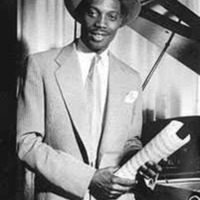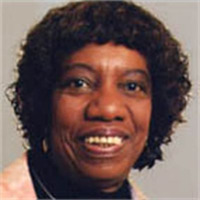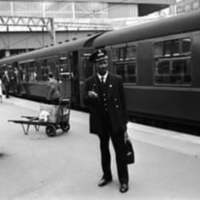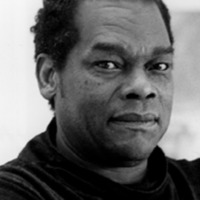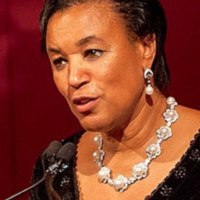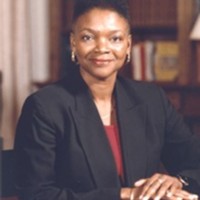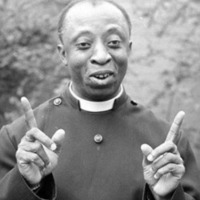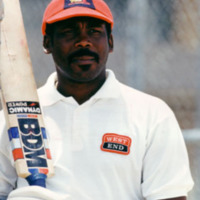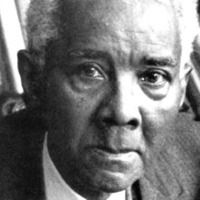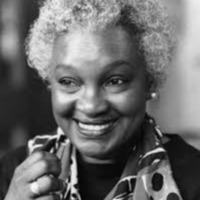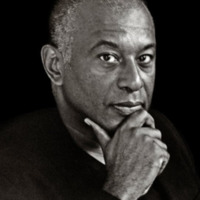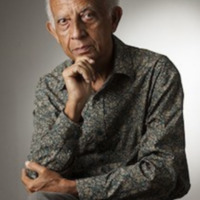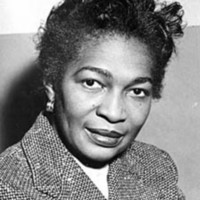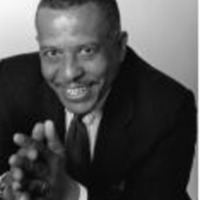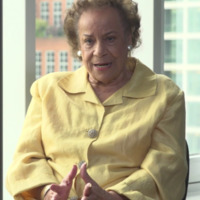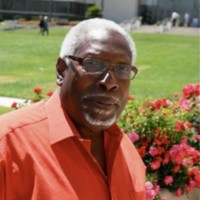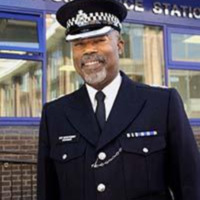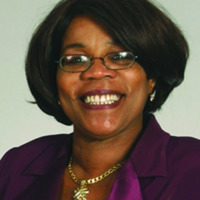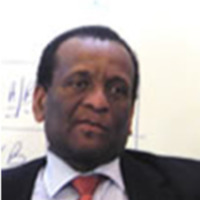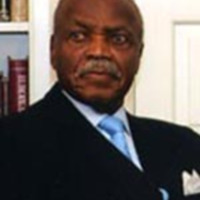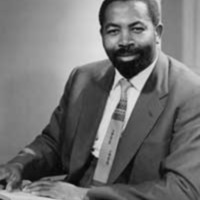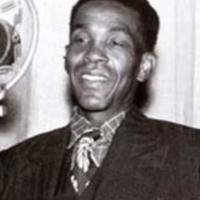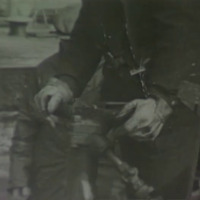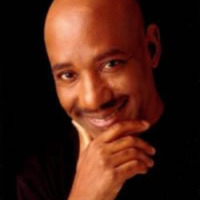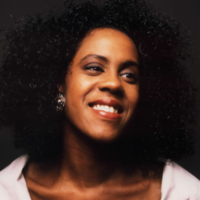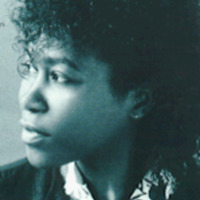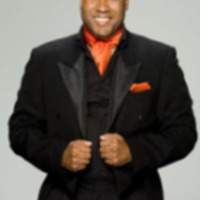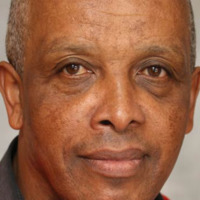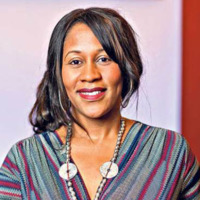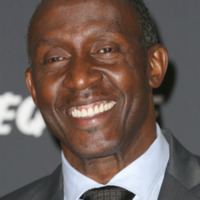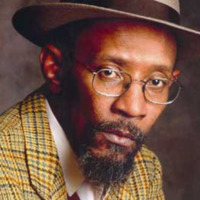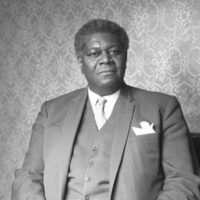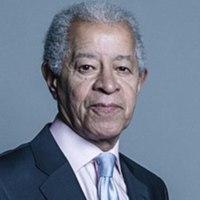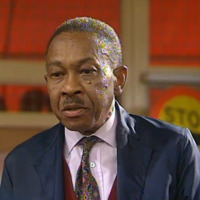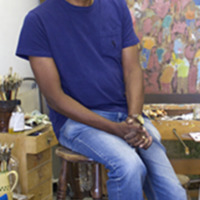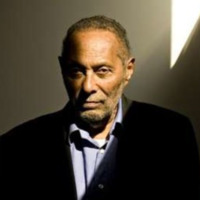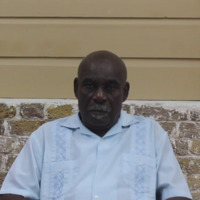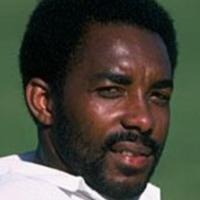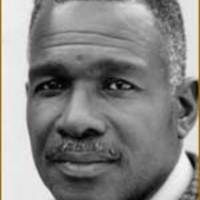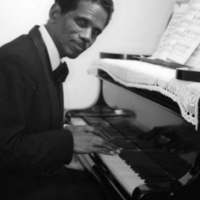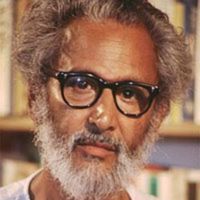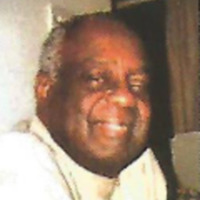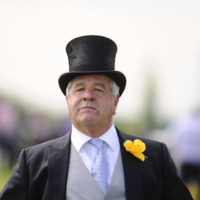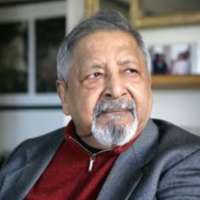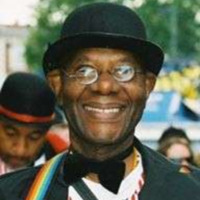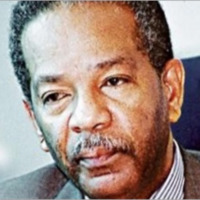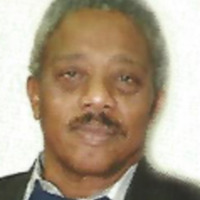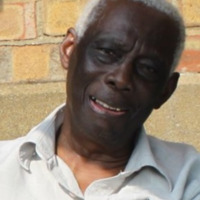Migration Stories
Story
Title: Aldwyn Roberts (Lord Kitchener)
Description: Lord Kitchener, (Aldwyn Roberts), Trinidadian singer and songwriter (born April 18, 1922, Arima, Trinidad, British West Indies — died Feb. 11, 2000, Port of Spain, Trinidad and Tobago), was called the “grandmaster of calypso” and was instrumental in popularizing that music internationally. He was especially admired for his melodious style and his witty, often bawdy, lyrics. In 1947, Kitch was proclaimed the best calypsonian of the year. His big tunes for that year were "Scandal in St. Ann's," "Mount Olga," and "Tie Tongue Mopsy." Soon after the success of 1947, Kitch left T&T; for Aruba, then on to Jamaica, where he lived for six months, teaching calypso and playing to packed audiences. After Jamaica, the next stop was London. Kitch arrived on a boat, the M.V. Windrush, at the port city of Tilbury on June 21, 1948. One of the other passengers on that M.V. Windrush was Egbert Moore (Lord Beginner). Kitch got an immediate booking at the only West Indian club in London, following his debut on the BBC. Six months later, Kitch was appearing in three clubs nightly, and his popularity extended beyond the West Indian and African night club audiences, to include music hall and variety show audiences. The days in London were very good days for Kitch. He had everything he wanted. Lots of money, fan mail from all over the world, clothes, fancy hats and shoes, and lots of lady friends. But the night life was getting the better of Kitch. Therefore, he decided to slow down, leave London, and move to Manchester in the north of England. There, he met, and in 1953, married his English wife, Marjorie. Kitch also started writing calypsoes again in 1953, and in that year he wrote "Africa My Home," "Beware Tokyo," and "If You Not White, You Considered Black." Soon, Kitch opened his own club in Manchester, and also received a six month contract to tour the U.S. where he appeared in New York, Washington D.C., and other cities on the East Coast. Kitch later returned to England, and in 1958 he made his first of several recordings for the Melodisc record label. The days in Manchester were even more successful for Kitch than his days in London. He became the proprietor of a two-apartment buildings, expanded his club, and formed a dance band. During the 17 years Kitch was away from T&T;, he sent back great calypso tunes which became very popular. Tunes like "Mama Look The Band Passing," "Nora, Nora, Nora," "Trouble In Arima," belong to this period. After living in London from 1948 to 1962, Lord Kitchener returned to newly independent Trinidad and Tobago, where he won the coveted title Road March King at Port of Spain’s carnival 10 times before he ceased to compete in 1976. In the 1990s his image appeared on a stamp, and a statue was erected in his honour in Port of Spain.
Story
Title: Althea McNish FCSD
Description: Althea McNish FCSD (born c. 1933) is a British textile designer of Trinidadian origin who has been called the first British designer of African descent to earn an international reputation. Althea Marjorie McNish was born in Port of Spain, Trinidad, around 1933. Her father, the writer Joseph Claude McNish, was descended from the Merikin settlers in Trinidad. She painted as a child, was a junior member of the Trinidad Arts Society and had her first exhibition at the age of 16. Her influences included local artists Sybil Atteck, Amy Leong Pang and Boscoe Holder, and European modernists such as Vincent Van Gogh. In the early 1950s McNish moved with her mother to London, England, to join her father there. She already had a place to study at the Architectural Association School of Architecture in Bedford Square but instead took courses at the London School of Printing and Graphic Arts, the Central School of Arts and Crafts and the Royal College of Art. In her final year at the London School of Printing and Graphic Arts, she became interested in textiles with the encouragement of Eduardo Paolozzi, and chose printed textiles as her subject of study on progressing to the Royal College of Art, where her talent was recognised by Hugh Casson. On graduating, she immediately won a commission from Arthur Stewart-Liberty, head of the Liberty Department Store, sending her the same day to Zika Ascher, who commissioned her to design a collection for Dior. Successfully designing for such prestigious clients, McNish was the first Caribbean woman to achieve prominence in this field. She was associated with the Caribbean Artists Movement (CAM) in the 1960s, participating in CAM's exhibitions and seminars and helping to promote Caribbean arts to a British public. She took part in the art exhibitions of the Caribbean Artists Movement (CAM) held in 1967, May 1968 and January 1971, exhibiting textiles as well as "plastic panels in laminate". For the Caribbean edition of the BBC TV magazine programme Full House, produced by John La Rose and transmitted on 3 February 1973, she brought together the work of CAM visual artists as a studio setting for CAM writers, musicians and film-makers. Her work is represented in the collections of the Victoria and Albert Museum, the Whitworth Museum, the Philadelphia Museum of Art and the Cooper-Hewitt (Smithsonian Design Museum), among other places.
Story
Title: Asquith Xavier
Description: Asquith Camile Xavier was a West Indian-born Briton who ended a colour bar at British Railways in London by fighting to become the first non-white train guard at Euston railway station in 1966. Trevor Phillips, when chairman of the Commission for Racial Equality, said in 2006: "Asquith's stand against discrimination brought to light the inadequacy of early race discrimination laws and persistent widespread discrimination faced by ethnic minorities." A plaque at the station commemorates his achievement. Xavier was born on 18 July 1920 in Dominica, which was then a British colony. He was a member of the Windrush generation of British African-Caribbean people who migrated to the United Kingdom after the second world war to fill vacancies in service industries. Xavier joined British Railways. In 1966 he was working as a guard at Marylebone station in central London. He applied for a promotion and transfer to work at Euston, but was rejected. A letter from a staff committee at Euston—which was dominated by members of the National Union of Railwaymen—explained it was because of his colour. Unions and management had informally agreed in the 1950s to ban non-white people from jobs at Euston that involved contact with the public; they could be cleaners and labourers, but not guards or ticket collectors.
Story
Title: Aubrey Williams
Description: Aubrey Williams (8 May 1926 – 17 April 1990) was a Guyanese artist. He was best known for his large, oil-on-canvas paintings, which combine elements of abstract expressionism with forms, images and symbols inspired by the pre-Columbian art of indigenous peoples of the Americas. Born in Georgetown in British Guiana (now Guyana), Williams began drawing and painting at an early age. He received informal art tutoring from the age of three, and joined the Working Peoples' Art Class at the age of 12. After training as an agronomist he worked as an Agricultural Field Officer for eight years, initially on the sugar plantations of the East Coast and later in the North-West region of the country — an area inhabited primarily by the indigenous Warao people. His time among the Warao had a dramatic impact on his artistic approach, and initiated the complex obsession with pre-Columbian arts and cultures that ran throughout his artistic career. Williams left Guyana at the height of the Independence Movement in 1952, and moved to the United Kingdom. Following his first exhibition in London in 1954, he became an increasingly significant figure in the post-war British avant-garde art scene, particularly through his association with Denis Bowen's New Vision Centre Gallery. In 1966, he came together with a group of London-based Caribbean artists and intellectuals to found the Caribbean Artists Movement, which served as a dynamic hub of cultural events and activity until its dissolution in 1972.
Story
Title: Baroness Patricia Scotland
Description: Queens Council and joint first black woman peer, Patricia Scotland was born in Dominica in 1956, and arrived in Britain at the age of 2 along with 10 other siblings. As she grew she took a liking for dance and wanted to be a modern expressionist ballet dancer at 16. She later attended university and distinguished herself as a lawyer before entering the political arena in 1977, where she was called to the bar and served two terms of government for Labour firstly in the Foreign and Commonwealth Office as Foreign Office Minister working for the home department at the Lord Chancellor's Office. There she is effectively number two to Lord Irvine of Largs and the lead minister on immigration and asylum matters, legal aid, legal services and the development of Civil Law in the UK In 1991 she made legal history becoming the first black female QC (Queens Counsel) at the age of 35. She was made a bencher of the Middle Temple in 1997, becoming a judge in 1999, and raised to the Privy Council in 2001. She is also a member of the bar in Antigua and Dominica. In 1997 she was created a peer as Baroness Scotland of Asthal, in the County of Oxfordshire. Baroness Scotland has received numerous awards and commendations including an honorary degree from the University of Westminster for services to law, government, social justice and International affairs. Among her other accomplishments is or has been Chair of HMG Caribbean Advisory Group; Dominican Representative of the Council of British Commonwealth Ex-Services League; Member of the Lawyers' Christian Fellowship; Member of the BBC World Service Consultative Group Lifeline (Trinidad & Tobago); Honorary Fellow of Wolfson College, Cambridge, Member of The Millennium Commission; Patron of the Women and Children's Welfare Fund. She has specialized in family and public law and has chaired and represented parties in a number of major inquiries relating to Child Abuse, Mental Health and Housing.
Story
Title: Baroness Valerie Amos
Description: Baroness Valerie Amos was the first black woman cabinet minister and joint first black woman peer and recently appointed Leader of the House of Lords, the third woman in history to lead the upper house of Parliament. Baroness Amos is one of three black peers that sit in the House of Lords. She was created a life peer in 1997. She is what is referred as 'a working peer', and is currently the Secretary of State for International Development. Born in March 1954 in Guyana, Valerie Ann Amos began her career in local government, working in various London boroughs from 1981 to 1989. She was educated at Townley Grammar School for Girls before completing a degree in sociology at Warwick University in 1976, a master's degree in cultural studies from Birmingham University in 1977 and doctoral research at University of East Anglia. Prior to her appointment as Secretary of State for International Development, Baroness Amos was appointed Parliamentary Under-Secretary for Foreign & Commonwealth Affairs in June 2001 with responsibility for Africa, the Commonwealth, the Caribbean, Overseas Territories, Consular Issues and FCO Personnel. Previously she was the Government Whip from 1998 to 2001 and a co-opted member, European Union Sub-committee F (Social Affairs, Education and Home Affairs) from 1997-98. She was spokesperson for social security 1998-2001, international development since 1998, women's issues 1998-2001, and foreign and commonwealth office 2001. She was chief executive of the Equal Opportunities Commission from 1989 to 1994, and then director of Amos Fraser Bernard from 1995 to 1998. She was deputy chair of the Runnymede Trust, a trustee of Institute of Public Policy Research and involved in Project Hope, an NGO which promotes healthcare. Her charity works involved being the chair of the board of governors at Royal College of Nursing Institute from 1994 to 1998 and one of the directors of Hampstead Theatre
Story
Title: Bishop Wilfred Wood KA
Description: Wilfred Denniston Wood KA (born 15 June 1936) was Bishop of Croydon from 1985 to 2003, the first black bishop in the Church of England Born in Barbados to Wilfred Coward and Elsie Elmira Wood, in Proute, St Thomas, Wood [later Sir Wilfred] attended Southborough Boys’ Primary School and Combermere School. Having being ordained Deacon on the island after completion of studies in 1962, Bishop Wood’s journey had just begun as he was sent to the Diocese of London, first serving in a parish called St. Stephen’s Shepherd’s Bush, where he served as a curate, then honorary curate, of St Thomas with St Stephen, Shepherd’s Bush, until 1974. He soon came to wider attention in Britain for speaking out on racial injustice. In 1974 he joined the Diocese of Southwark, where he stayed until his retirement. In 1977 he was appointed Rural Dean of East Lewisham and Honorary Canon of Southwark Cathedral. He was Archdeacon of Southwark from 1982 until his consecration as Bishop of Croydon in 1985, where he oversaw the Croydon Episcopal Area and assisted the Bishop of Southwark. Throughout his Ministry, Bishop Wood had a strong interest in race relations and social justice in London, as it was for this interest that he was appointed the Bishop of London Officer in race relations, also serving on a number of other important boards, from 1978 to 1981.
Story
Title: Brian Batson
Description: Just a quick intro as to why we migrated to Barbados due to post economic conditions in Guyana. again I was very young so I could only go off of what my mother told me as a child. All I know for sure is that she wouldn't have left Guyana unless it was essential to our well being and growth as individuals. She her self goes back from time to time but U have never been back since but I've already had plans to go back whenever I am able to because I heard its very beautiful indeed!
Story
Title: C. Gordon Greenidge MBE
Description: Cuthbert Gordon Greenidge was born in Barbados and like many Caribbean families in the late 50’s and 60’s migrated to the UK to seek a better life. Educated at Speightstown Boys School and Black Bess Boys School in Barbados, he continued his education at Alfred Sutton Boys in Reading, and later Clarendon College in Nottingham, where he developed a love for cricket, a game for which he would later become world famous. He had the opportunity to display his cricket prowess playing in Reading, Berkshire and Hampshire and the England Boys School benefitted from his cricket skills. Even though he represented Barbados and the West Indies in cricket, he was still able to make a meaningful contribution to his adopted homeland of the United Kingdom. Whilst still an apprentice at Hampshire, he represented three different clubs playing on Wednesdays, Saturdays and Sundays. He was also privileged to play League Cricket for Leyland in the Lancashire League, playing 19 years for one club. Not only has he been a player but he also conducted Cricket Coaching Clinics at several places, including Nottingham High School and Merchant Taylor’s School. Schools in Scotland have also benefitted from his skills when playing for the club Greenock, which he also represented at the National Level. He continues to be involved in fund raising programmes for clubs and schools throughout the UK.
Story
Title: C.L.R. James
Description: C.L.R. James, in full Cyril Lionel Robert James, (born Jan. 4, 1901, Tunapuna, Trinidad — died May 31, 1989, London, Eng.), was a West Indian-born cultural historian, cricket writer, and political activist who was a leading figure in the Pan-African movement. James was certified as a teacher at Queen’s Royal College in Port of Spain, Trinidad (1918). In 1932 he moved to England, where he published The Life of Captain Cipriani (1932; revised as The Case for West-Indian Self-Government, 1933) with the personal and financial support of the West Indian cricketer and politician Learie (later Lord) Constantine. During the 1930s James was a cricket correspondent for The Guardian (Manchester) and became increasingly involved in Marxist politics and the African and West Indian independence movements. His most notable work was The Black Jacobins (1938), a Marxist study of the Haitian slave revolution of the 1790s, which won him widespread acclaim. James left England to live in the United States (1939–53), but he was expelled for political reasons. He was interned at Ellis Island in New York City, where he wrote an analysis of Herman Melville’s Moby Dick called Mariners, Renegades, and Castaways (1953). Thereafter he moved between London and Trinidad, where he was secretary of the West Indies Federal Labour Party (1958–60). In Beyond a Boundary (1963) James discussed the importance of cricket to the British character and to the development of the West Indies. His other books included the novel Minty Alley (1936), World Revolution (1937), Notes on Dialectics (1971), Nkrumah and the Ghana Revolution (1977), and Cricket (1986), a collection of articles spanning the period 1935 to 1985.
Story
Title: Carmen Munroe OBE
Description: Carmen Munroe is a British actress best known for her role as Shirley, the wife of barber Desmond Ambrose, played by Norman Beaton, in the British TV sitcom Desmond’s (1989 to 1994). She was born in Berbice, Guyana on November 12th 1932 and has been a resident of the UK since the early 1950’s where she performed with the West Indian Students’ Drama Group. In 1962 she made her professional stage debut at London’s Wyndham’s Theatre in Tennessee Williams’ Period of Adjustment, and later played leading roles in other West End productions: Alun Owen’s There’ll Be Some Changes Made (1969), Jean Genet’s The Blacks (1970), and as Orinthia in George Bernard Shaw’s The Apple Cart (1970). Carmen has played an instrumental role in the development of black British theatre and representation on small screen. She has had high-profile roles on television in The Fosters (1976–77), Mixed Blessings (1978–80), both on ITV, and on stage in Lorraine Hansberry’s A Raisin in the Sun, Alice Childress’s Trouble in Mind and James Baldwin’s The Amen Corner. Some of her other roles include a part in the 1967 Doctor Who story “The Enemy of the World”; a part in General Hospital; and she was for a time a presenter of Play School. She is also one of the founders of Talawa, the UK’s leading black theatre company, which she established in 1985 together with Mona Hammond, Inigo Espegel and Yvonne Brewster.
Story
Title: Caryl Phillips
Description: Caryl Phillips was born on 13 March 1958 on the Caribbean island of St Kitts. He grew up in Leeds, England, and read English at Queen's College, Oxford. He is the author of six novels, several books of non-fiction and has written for film, theatre, radio and television. Much of his writing - both fiction and non-fiction - has focused on the legacy of the Atlantic slave trade and its consequences for the African Diaspora. The Final Passage (1985), his first novel, won the Malcolm X Prize for Literature. It tells the story of a young woman who leaves her home in the Caribbean to start a new life with her husband and baby in 1950s London. His second novel, A State of Independence (1986), is set in the Caribbean and explores the islands' growing dependency on America. Higher Ground (1989) consists of three narratives linking the lives of a West African slave, a member of the Black Panther movement and a Polish immigrant living in post-war Britain. Cambridge (1991), his fourth novel, is set in the first half of the nineteenth century and centres on the experiences of a young Englishwoman visiting her father's plantation in the Caribbean. The book won the Sunday Times Young Writer of the Year Award. Crossing the River (1993) won the James Tait Black Memorial Prize (for fiction) and was shortlisted for the Booker Prize for Fiction. Phillips' non-fiction includes a travel narrative, The European Tribe (1987), winner of the Martin Luther King Memorial Prize, and The Atlantic Sound (2000), an account of a journey he made to three vital hubs of the Atlantic slave trade: Liverpool in England, Elmina on the west coast of Ghana, and Charleston in the American South. A New World Order: Selected Essays was published in 2001, and A Distant Shore in 2003, the latter being an exploration of isolation and consolation in an English village. He is also the editor of Extravagant Strangers (1997), a collection of writings by British writers born outside Britain, including work by Ignatius Sancho, Rudyard Kipling, Samuel Selvon and Salman Rushdie, and he wrote the screenplay for the film adaptation of V. S. Naipaul's novel The Mystic Masseur, first screened in 2001. His work also includes stage and radio drama, most recently the play Rough Crossings (2007). He was awarded a Guggenheim Foundation Fellowship in 1992 and a Lannan Literary Award in 1994. He has taught at universities in Europe, Africa, Asia, the Caribbean and the United States, where he was Professor of English at Amherst College, Massachusetts (1994-8). Since 1998 he has been Professor of English and Henry R. Luce Professor of Migration and Social Order at Barnard College, Columbia University, New York. He became a Fellow of the Royal Society of Literature in 2000.
Story
Title: Cecil Baugh
Description: Cecil Archibald Baugh, Jamaican potter (born Nov. 22, 1908, Bangor Ridge, Jam.—died June 28, 2005, Kingston, Jam.), was one of the most influential Caribbean potters of the 20th century and was renowned for works that showcased his artistry and technical creativity. During his adolescent years he was given the task to take food for his brother at Long Mountain Road (now Mountain View Avenue. It was here that he was first exposed to the ancient art of pottery. Young Cecil Baugh watched the women who made and fired the yabbah bowls which were produced by a technique which survived from the days of slavery itself, and was of African origin. His first efforts were limited to ‘dollyhouse’ items including little clay tables and chairs, which brought him earnings of three shillings a week on average. He soon ‘graduated’ into making flower pots and yabbahs. He increased his earnings but more importantly, fuelled the fires of his ambition. He was about 25 years old in 1933 when an incident occurred bringing a new dimension to his work and changing the face of ceramics. One night while firing his day’s work he noticed fire escaping through the top of his rude kiln. Not wanting the temperature to drop he quickly grabbed the nearest thing he could find to cover it. It was a sheet of copper. As the copper became increasingly hot, he saw a flame coming from it. It was not orange-red as he was used to, but turquoise. As it licked at the night Cecil Baugh thought it was the prettiest colour he had ever seen, and he thought about capturing that colour in his work. Having no formal education in chemistry he quite often did not get the colours he tried for, but whatever came out was new to Jamaicans and he sold all he could make In 1941, in response to a newspaper advertisement Cecil Baugh enlisted in the Royal Engineers of the British Army. He kept in close touch with his art, but because of World War II, work in ceramics was at a minimum. He claimed that in 1942 his Division was sent to Cairo and it was there that he saw the Persian Blue, a colour quite similar to what he had got using copper oxide and glass in Jamaica. He was greatly encouraged. Cecil wanted to know everything there was to know about ceramics to enhance his teaching skills upon returning to Jamaica. When he returned to Jamaica in 1946 he was not satisfied with the extent of his knowledge. He wanted to return to England to study under the most respected figure in ceramics in the Western world, Bernard Leach. However, no scholarships were available and when contacted, Leach said he had no time for beginners. Cecil remained undaunted, went to England to study with another ceramist, and would not rest until he managed to secure a one-year term under the guidance of Bernard Leach who was regarded as the ‘Father of British Studio Pottery’. It was the beginning of a friendship, which lasted throughout the years. He returned to Jamaica in 1949 and in 1950 mounted his first one-man exhibition. Soon after with Albert Huie, Linden Leslie, Jerry Isaacs and Edna Manley formed the Jamaica School of Art. Cecil Baugh was the last to leave the institution when he retired in 1975. In 1991 the National Gallery opened a ceramics gallery bearing his name, and in 2003 he received the Order of Jamaica.
Story
Title: Claudia Jones
Description: Claudia Jones, feminist, black nationalist, political activist, community leader, communist and journalist, has been described as the mother of the Notting Hill Carnival. The diversity of her political affiliations clearly illustrated her multifaceted approach to the struggle for equal rights in the 20th century. She was born in Belmont, Port-of-Spain, Trinidad in 1915 and at the age of eight moved to Harlem, New York with her parents and three sisters. Her education was cut short by Tuberculosis and the damage to her lungs as well as severe heart disease plagued Claudia for the rest of her life. For over 30 years she lived in New York and during this time became an active member of the American Communist party, an organisation in which her journalistic and community leadership skills were maximised. By 1948 she had become the editor of Negro Affairs for the party's paper the Daily Worker and had evolved into an accomplished speaker on human and civil rights. In 1955 she was deported from the US and given asylum in England, where she spent her remaining years working with London's African-Caribbean community. She founded and edited The West Indian Gazette which despite financial problems remained crucial in her fight for equal opportunities for black people. Claudia Jones lasting legacy is undoubtedly the Notting Hill Carnival, which she helped launch in 1959 as an annual showcase for Caribbean talent. These early celebrations were held in halls and were epitomised by the slogan, 'A people's art is the genesis of their freedom'.
Story
Title: Cyrille Regis, MBE
Description: Cyrille Regis was born on the 9th of February 1958 in Maripasoula, French Guiana, the son of Robert Regis, a labourer from Saint Lucia and Mathilde Regis, a seamstress. His father moved to England in 1962, with the rest of the family, including Cyrille, following a year later. Cyrille grew up in Harlesden, located in the Borough of Brent, and attended Cardinal Hinsley Maths & Computing College. After leaving school, Regis trained as an electrician, earning a City and Guilds diploma; he continued to practise the trade until his move into professional football. Regis was an English international footballer who played as a forward. His professional playing career spanned 19 years, where he made 614 league appearances and scored 158 league goals, most prolifically at West Bromwich Albion and Coventry City. He also won five caps with the England national team. He was a pioneer for black footballers in the game when he played alongside Laurie Cunningham and Brendon Batson at The Hawthorns. Regis, along with Brendon Batson and Laurie Cunningham at West Brom and the likes of Viv Anderson at Nottingham Forest, broke down barriers and demonstrated what could be achieved at a time when high-profile black players were a rarity in Britain.
Story
Title: Dalton McConney MBE QPM
Description: Dalton McConney is a retired Metropolitan Police Chief Inspector. He mostly served as a uniformed officer in South London and came to prominence following the second Brixton riots In the mid-eighties. He was born in Barbados and educated at Ebenezer Boys and the Modern High School. He worked as a proof reader at the Barbados Advocate newspaper and at the Government Printing Office before joining the economic migration to the UK in I960. Aged 36, he joined the Metropolitan Police in 1976. He served as a Constable at Battersea, Sergeant at Belgravia and a Recruit Instructor at Hendon Police College. He obtained the Certificate of Education (University of London), helped to research the new Police & Criminal Evidence Act 1984, updated the Training Manual and taught the changes in the Act to instructors. He passed the Inspector’s examination in 1988 and was posted to Brixton after the second riots. He was the first senior black officer to serve at Brixton Police Station in the Borough of Lambeth. gaining the trust of residents and helping to lower tensions. He also set up the “Brixton Summer Project” during the school holidays, engaging local unemployed youth as staff. A two-part C4 documentary, “The Brixton Beat”, highlighted Dalton’s role in the changes at Brixton. He received a Lambeth Civic Award, the Mayor’s Special Award and in 1994 was awarded the MBE for Police/Community Service. He was promoted to Chief Inspector in 1994, becoming Staff Officer to the Assistant Commissioner. As Personnel Manager at Walworth Police Station, he set up the first Criminal Justice Unit and formulated a strategy to deal with street robbery (Operation Eagle Eye)i. He received two Assistant Commissioner’s Commendations for this work. After serving in Bromley, he returned to Lambeth where he devised the Policing Diversity Strategy and Community/ Race Relations programme. He was awarded the Police Long Service and Good Conduct Medal, featured in books highlighting black achievements for the Millennium and was one of the subjects of the “Black Power” photographic exhibition at the National Portrait Gallery. On retirement, he was awarded the Queen’s Police Medal for Distinguished Police Service and later received an Assistant Commissioner’s Commendation for work on Critical Incident Management. Dalton also supports various Barbadian Organisations in London and continues to use the high profile of his career to promote Barbados
Story
Title: Dame Jocelyn Barrow
Description: Dame Jocelyn Anita Barrow DBE (15 April 1929) was born in Trinidad, where she was active in the People's National Movement, and came to England as a postgraduate in 1959. The Director for UK Development at Focus Consultancy Ltd. Dame Jocelyn was a founding member and General Secretary of CARD (Campaign Against Racial Discrimination), the organisation responsible for the Race Relations legislation of 1968. As a senior teacher, and later as a teacher-trainer, at Furzedown College and at the Institute of Education London University in the '60s, she pioneered the introduction of multi-cultural education, stressing the needs of the various ethnic groups in the UK. She was the first black woman Governor of the BBC and Founder and Deputy Chair of the Broadcasting Standards Council. Her equal opportunities and educational expertise is reflected in her many Government appointments to a variety of organisations and statutory bodies. Governor of the Commonwealth Institute for eight years, Council Member of Goldsmith's College, University of London, Vice-president of the United Nations Association in the UK and Northern Ireland and Trustee to the Irene Taylor Trust providing Music in Prisons. She is National Vice-President of the Townswomen's Guild and was instrumental in the establishment of the North Atlantic Slavery Gallery and the Maritime Museum in Liverpool. She was a Trustee of the National Museums and Galleries on Merseyside and a Governor of the British Film Institute. In 1972 she was awarded the OBE for work in the field of education and community relations. In 1992 she received the DBE for her work in broadcasting and her contribution to the work of the European Union as the UK Member of the Social Economic Committee
Story
Title: Darcus Howe
Description: Leighton Rhett Radford "Darcus" Howe (26 February 1943 – 1 April 2017) was a British broadcaster, writer, and racial justice campaigner. Originally from Trinidad, Howe arrived in England as a teenager in 1961, intending to study law and settling in London. There he joined the British Black Panthers, a group named in sympathy with the US Black Panther Party. At the age of 18, after leaving QRC, Howe moved to England, arriving on the SS Antilles at Southampton on 11 April 1961, after a two-week journey, and taking a train on to London Waterloo station. He intended to study law, but after two years at Middle Temple he left, becoming more involved with journalism. In 1969 he returned to Trinidad, where his uncle and mentor, radical intellectual C. L. R. James, inspired him to combine writing with political activism. A brief spell as assistant editor on the Vanguard, weekly newspaper of the Oilfields Workers' Trade Union, was followed by a return to Britain.
Story
Title: Dr Aaron Haynes FCMI
Description: Born on the 12th of March 1927, Aaron attended Combermere School after which he travelled to Trinidad to attend the Seventh Day Adventist College. He graduated from there in 1945, gaining a teaching posting at an elementary school in San Juan and Sangre Grande two years later. Two years at Port of Spain Secondary School prepared him for the post of Principal of Southern Academy. Two years later, he left to attend Long Island University in Brooklyn N.Y, where he majored in biology while working at Brooklyn Jewish Hospital as a technician in the blood laboratory. He came to England in 1965 and at first taught biology and chemistry at Pollards Hill Secondary School before entering the field of Race and Community Relations. He served as senior community relations officer in Wolverhampton before moving on to the Community Relations Commission as Principal Development Officer. He held several posts in the Commission for Racial Equality, culminating in the post of Chief Executive. After retiring from the Commission, he functioned as a freelance journalist and broadcaster. He is the author of The State of Black Britain Volume One, first published in 1983, which carries an analysis of the forces that governed the post-war immigration of black people into Britain. It covers the search for jobs and housing, the challenges faced in education and social services and how race became a volatile political issue. Volume Two picks up where Volume One concludes and begins with an analysis of the Thatcher years and their impact on the Black community. Together the two volumes represent a comprehensive, honest, insider’s view of the struggle for equality in Britain
Story
Title: Dr Jeffrey Brathwaite QPM
Description: Dr Jeffrey Brathwaite was born in Congo Road, St Philip, Barbados. He was a student at Princess Margaret High School until the age of 16. He came to the UK in the late 1960s and after a short stint in the Army, worked as a psychiatric nurse for four years. Dr Brathwaite joined the Metropolitan Police Service on the 2nd of December 1974 as a constable. He rose through the ranks in both Uniform and CID roles. In 1997, as Uniform Superintendent he was responsible for operational policing in the Borough of Croydon until a year later, when he was appointed Deputy Director of the Racial and Violent Crime Task Force at New Scotland Yard. The Task Force provided leadership and vision at a time of crisis, during the high profile Stephen Lawrence Inquiry. One of his key achievements at that time was the development and coordination of the first Independent Advisory Group in UK policing. Independent advisors now bring community perspectives to policing that have proved beneficial to community-police relationships over the years while independent Advisory groups have been adopted by most of the UK Police Services. In 2001, Dr Brathwaite was promoted to Chief Superintendent and appointed Police Borough Commander for the Royal Borough of Kingston upon Thames. In 2003, he was awarded the Queen’s Police Medal for distinguished Police service in the community. He was presented with the medal by Her Majesty the Queen at Buckingham Palace in April of that year. Dr Brathwaite retired from the Metropolitan Police on the June 4th, 2004 after 30 years of service. Following that, he pursued a second career as an Organisational Management Consultant until 2015 when he finally retired from full time employment
Story
Title: Dr Nola Ishmael OBE
Description: Nola Ishmael left Barbados In 1963 to start her nursing career in the National Health Service (NHS) at a hospital in Bishops Stortford. She later moved to the Whittington Hospital in London to gain her State Registration Qualification. Within 18 months of qualifying as a nurse she was promoted to Unit Sister in the Neurosurgical Unit of the Maudsley Hospital in London. Later she went on to qualify as a Health visitor. In 1981, she became a Community Manager and in 1987 became Assistant Director of Nursing in Greenwich. Eighteen months later she was appointed Director of Nursing, thereby becoming the first black Nursing Director in the NHS in London. Nola was invited in 1994 to the Department of Health for six months which evolved into a ten year tenure, where she worked closely with Ministers and Chief Nursing Officers in different roles, including Professional Private Secretary to the Chief Nursing Officer. She later added Nursing Policy responsibilities in Public Health areas and Black and Minority Ethnic issues to her portfolio. Nola initiated programmes of mentoring, coaching and personal development, and collaborated on the establishment of the Mary Seacole Leadership Awards. She co-produced the Department’s publication Many Rivers to Cross which chronicled the contribution of Caribbean staff to the NHS. She worked closely with organisations such as Barbados Overseas Nursing Association (BONA) and the Royal College of Nursing, as well as sitting on the boards of a number of charitable organisations. She is Patron of the Sickle Cell Society and past Vice Chair of Greenwich Community College. Nola is active as a mentor and motivational speaker. She travelled across the UK and overseas including Australia, Europe, Africa and the Caribbean, including Barbados, representing the Department of Health. Nola is a member of the High Commission Health and Welfare Group. Nola’s service was recognised in the NHS with her receiving the Order of the British Empire (OBE) in the Queen’s Birthday Honours in 2000, and an Honorary Doctorate degree for services to Nursing from Birmingham City University. She also received a Breakthrough Equality Award from the Wainwright Trust and Nursing Times Magazine’s recognition as one of top 50 Influential Nurses in the last 100years. Nola was among 15 Health Leaders who had a Portrait displayed in the National Portrait Gallery in London in 2006
Story
Title: Dr Trevor Hall CBE
Description: Born in Barbados in 1941, in his teens Trevor became an outstanding leader in the Church Lads’ Brigade, first visiting the UK on its behalf, aged 16. In the early 60s, he travelled to England to work for London Transport while maintaining his commitment to community and youth work through the church. This led to a post as Administrator for the Church of England Board of Education, and the early beginnings of his influence on national thought and practice in race relations. He moved to Rugby in Community Relations, focusing specifically on young people, where his creative methods soon brought the very diverse communities of the town together, reaching the lives of children, young people, and adults alike. Never afraid to tackle the big issues, he initiated research, developed community initiatives, and pioneered multiracial youth international exchanges. He created innovative training programmes, gaining the confidence of communities, police, and local authority, to bring people together in challenging times in terms of race equality. With significant race relations legislation just beginning to emerge, Trevor’s skills and expertise were soon noticed at the national level and he was appointed in 1982 to the Home Office as Race Equality Adviser to the Permanent Secretary. Trevor was instrumental in transforming policy and practice, whilst maintaining absolute integrity and independent thought. As the most senior black civil servant of the time, Trevor was promoted to join the Management Board, sharing perspectives and initiatives at the very highest levels, always keeping in mind the interests of those unable easily to communicate with those in power. Trevor’s initiatives in training senior police, magistracy, senior judges and immigration service had a lasting impact, significantly changing race relations practice. Throughout, Trevor never lost track of his commitment to young people and communities, taking on the roles of Chair of the Commonwealth Youth Exchange Council, and Vice Chair of the National Youth Bureau. In the mid-80s, he spearheaded the establishment of the Windsor Fellowship, creating leadership development programmes for young Black and Asian undergraduates to enable them to compete positively in both public and private sectors, where they were significantly under-represented at senior level. Conventional retirement was not an option and on leaving the Home Office, Trevor was asked to continue as Race Advisor to the Lord Chancellor’s Department, and he continues even now to direct Windsor Fellowship programmes. In recognition of his outstanding work, Trevor has been recognised both by academia, through an honorary Doctorate in Law and Letters, and by government, having been awarded both an OBE and the CBE
Story
Title: E.R. Braithwaite
Description: E.R. Braithwaite, (Eustace Edward Ricardo Braithwaite), Guyanese author and diplomat (born June 27, 1912, Georgetown, British Guiana (now Guyana) — died December 12, 2016, Rockville, Md.), was the author of the best-selling memoir To Sir, with Love (1959), an account of his experience as a well-educated black man teaching a group of undisciplined high-school students in the slums of London’s East End. The book was translated into more than 20 languages and was made into an immensely popular 1967 film starring Sidney Poitier. Braithwaite was educated at Queens College in British Guiana and studied (1940) at the City College of New York before joining the Royal Air Force in Britain as a pilot. After World War II he earned (1949) a master’s degree in physics from the University of Cambridge. However, because of his race, he was unable to work in his field, but he did find employment teaching (1950–57) at a secondary school in London and later (1958–60) as a social worker finding foster homes for nonwhite children. He subsequently wrote Paid Servant (1962). Braithwaite worked as a human rights officer for the World Veterans Federation and later as an education consultant for UNESCO, and in 1966 he was appointed Guyana’s representative to the United Nations. He also served (1968–70) as Guyana’s ambassador to Venezuela. From 1970 he taught at various American universities. He wrote other books, notably the memoir Honorary White (1975), about a visit to South Africa.
Story
Title: Edric Connor
Description: Edric Connor is primarily remembered by filmgoers as an actor for his work on screen during the last 15 years of his life, but the Trinidad-born singer also played a pivotal role in the introduction of what is now called world music to England during the late '40s and early '50s. Born in Mayaro, Trinidad, in the British West Indies in 1913, he began singing as a young man and left Trinidad in 1944 for England, in search of wider success as both a musician and actor. Over the ensuing half decade, he became one of the leading exponents of West Indian music in England, in an era in which American jazz barely had a foothold. His performance with a steel band at the 1952 Festival of Britain in London was a major event in the musical life of postwar England, bringing exposure to a form of music that was beloved in a key part of the empire, and also planting a seed in the spread of Jamaican music that ultimately led to the boom in ska and reggae. Edric Connor and his wife, Pearl, became major stars in music and acting over the ensuing decade, Connor becoming the first black actor to work with the Royal Shakespeare Company and playing key roles in a dozen major British and international films. In 1952, teamed with a singing group, he released Songs from Jamaica, a groundbreaking LP of Jamaican folk music credited to Edric Connor & the Caribbeans, on the Argo label. Acting came to dominate Connor's career during his final decade, in which he worked in several major epic movies and some prominent British television shows
Story
Title: Egbert Moore (Lord Beginner)
Description: Lord Beginner (born Egbert Moore) was at the heart of the expansion of calypso music immediately after WW2. Originally from Trinidad, Beginner recorded and toured in New York with other leading members of the Trinidad's "Old Brigade" of calypsonians, but his cricket credentials were already established. In 1937 he wrote "Les Ames he played fine/Till he was bowled by the quicker ball from Constantine". In 1948 he emigrated to England on the Windrush, the first boat from the Caribbean bringing a new generation of immigrants to the UK. Also on the boat was the legendary calypsonian Lord Kitchener. Beginner began playing clubs throughout London - primarily the Caribbean and the Paramount - and was a success, signing for Parlophone in 1950. Two of Lord Beginner's more well known calypsos were Victory Test Match - penned immediately after the 1950 Lord's Test won by West Indies and opening with the line "Cricket, lovely cricket" - and General Election, inspired by Clement Atlee's victory in the 1950 general election.
Story
Title: Eric Lynch
Description: Eric Lynch speaks about his family history with ties from the Caribbean to Liverpool in the Claude Graham series "Unshackled". Footage courtesy the Caribbean Broadcasting Corporation.
Story
Title: Errol Brown
Description: Pop singer/songwriter and front man for Hot Chocolate, Errol Brown was born in Jamaica and moved to Britain when he was 12. His musical career started in 1969, when he and some friends sent a reggae version of Give Peace A Chance to John Lennon. Lennon liked the track, and it was released on the Beatles label, Apple Records, attributed to The Hot Chocolate Band which was later shortened. The producer Mickie Most signed him and Tony Wilson, the co-founder of the group as writers, and they wrote songs for Mary Hopkins and Herman's Hermits before deciding to write songs for themselves. In 1970, Hot Chocolate, with Errol as the lead singer released their first single, Love is Life, which reached No.6 in the charts. Brown's bald headed sexy image and unique voice as the central focus of the group led to many Top Ten hits such as It started with a Kiss, You Sexy Thing and Everyone's a Winner. In 1981, Hot Chocolate was invited by Prince Charles and Lady Diana to their pre-wedding reception. In 1985 Errol left the band to spend more time with his wife and children, and has since resurfaced to enjoy a successful solo career. Hot Chocolate enjoyed a revival when their hit You Sexy Thing was featured in the film The Full Monty. In June 2003 Errol was awarded an MBE for his services to popular music.
Story
Title: Errollyn Wallen MBE
Description: Born in Belize, Errollyn Wallen gave up her training at the Dance Theater of Harlem, New York to study composition at the universities of London and Cambridge. She founded her own Ensemble X, and its motto ’We don’t break down barriers in music… we don’t see any’ reflects her genuine, free-spirited approach and eclectic musicianship. She has been commissioned by outstanding music institutions from the BBC to the Royal Opera House and performed her songs internationally. Errollyn Wallen’s song Daedalus appears alongside songs by Björk, Sting, Elvis Costello and Meredith Monk on the Brodsky Quartet’s CD Moodswings. The two solo albums Meet Me at Harold Moores and most recently Errollyn feature her songs in her own voice/piano performance and in collaboration with outstanding jazz artists. Her multi-media show Jordan Town, a modern day song cycle with dance and film, was a sell-out hit at the Edinburgh Festival. The Errollyn Wallen Songbook, published by Edition Peters, comprises twelve of her celebrated songs for voice with piano accompaniment. Errollyn Wallen’s quality as a writer for the human voice becomes also apparent in her more classical vocal works: Are You Worried About the Rising Cost of Funerals is a song cycle for soprano and string quartet commissioned by the Birmingham Contemporary Music Group and recorded on her classical solo album The Girl in My Alphabet which received rave reviews at its release; Fairy Scary comprises song settings of fairy stories for voice and small instrumental ensemble and was commissioned by the Wigmore Hall; the Dunedin Consort commissioned and world-premièred Comfort Me with Apples for soloists and instrumental ensemble with words from The Song of Songs in September 2006.
Story
Title: Floella Benjamin
Description: Floella is best known to a generation as the presenter of the BBC's pre-school children's programme Play School, alongside mute co-stars Humpty, Jemima, and Little Ted but now she runs her own production company, and is also chairman of the film and television organisation BAFTA. She has promoted the Commonwealth around the world, and sits on the government's Millennium Commission alongside former Northern Ireland secretary Mo Mowlam, and former Conservative deputy leader Michael Heseltine. Born in Trinidad, she immigrated to the UK as a child in the early 1960s, where her family settled in the south London suburb of Beckenham. She left school with two A levels, eight O-levels, a talent for athletics, and a passion to become the first ever black woman bank manager. Benjamin passed her part one banking diploma, but her love for acting won her over, and her first major role was in the hippy musical Hair. Her big break came when she was cast as a prostitute in the prison drama Within These Walls, but it was her love for children which shone through, and she has now been involved with children's television for 23 years
Story
Title: Guy Reid-Bailey
Description: Guy moved from Jamaica to Bristol in 1961 to live with his aunt, as his father thought that he would receive a better education in England, which they called the ‘Mother Country’. Guy was disappointed by the lack of support for Black students and the failure to teach history from a Black perspective. Guy had to teach himself about important Black heroes like Malcolm X, Marcus Garvey, Martin Luther King and Mary Seacole.
Story
Title: Hedda Phillips-Boyce
Description: Childhood memories
Story
Title: Joan Armatrading
Description: Pioneer of British rock during the 70s; singer/songwriter, Joan Armatrading is credited with being the first black female singer/songwriter to gain prominence on the British music scene. She offered a unique take on folk and reggae that was highly influential to artists like Tasmin Archer and Tracy Chapman. Born in St Kitts in 1950, she moved to Birmingham with her family when she was eight, where she taught herself to play piano and guitar. She began her career playing small sets of her own music at local clubs as a teenager. While touring with a production of Hair, she met Pam Nestor, who became her writing partner and the two collaborated on material that later featured on her first album. After this, Joan went solo and released Back to the Night. Her first commercial success was with her self titled release in 1976, and she followed that with 1977's Show Some Emotion and 1978's To The Limit. Armatrading's loyal cult following has kept her touring and recording for more than 25 years. Her classic songs - Love and Affection, Drop the Pilot, Me, Myself and I have earned her Grammy nominations. She has also accumulated 18 gold records, and 10 platinum records in her career, as well as critical acclaim. She is also in the enviable position of choosing her own touring and recording timetable.
Story
Title: John Barnes MBE
Description: John Charles Bryan Barnes MBE (born 7 November 1963) is an English former professional footballer and manager, who currently works as a commentator and pundit for ESPN and SuperSport. A fast, skillful left winger, Barnes had successful periods at Watford and Liverpool in the 1980s and 1990s, and won 79 caps for England. Born and initially raised in Jamaica, the son of a military officer from Trinidad and Tobago and a Jamaican mother, Barnes moved to London with his family when he was 12 years old. He joined Watford at the age of 17 in 1981 and over the next six years made 296 appearances for the club, scoring 85 goals. He made his debut for England in 1983 and four years later joined Liverpool for £900,000. Between 1987 and 1997 Barnes won the then top-flight First Division twice and the FA Cup twice with Liverpool, scoring 106 goals in 403 matches. By the time of his last appearance for England in 1995, he had played more times than any other black player. His brilliant solo goal against Brazil in the Maracana Stadium in 1984 marked his arrival at international level. His dazzling and intuitive play made him a firm favourite with the Kop at Anfield during his stay with Liverpool and in 1993/1994 John was installed as Liverpool club captain. Under the management of Graeme Souness and Roy Evans, John moved from playing on the wing to central midfield where his vision and passing ability established him at the centre of Liverpool's exciting young team.
Story
Title: John Holder
Description: Born and brought up in superlative St George, John was educated at St Giles School, then Combermere High School, representing Combermere at first team level in Barbados first division cricket competition. In 1964, he migrated to the UK under London Transport’s recruitment scheme to work on the Underground as a guard. The BBC invited him to play in its cricket team, where he joined two other Barbadians, Rodney Norville and the late Dr Bertie Clarke. At this stage he bowled genuinely fast and Dr Clarke recommended him to Hampshire to play county cricket. A serious back injury brought an end to his County career, after which he moved back to Barbados briefly. An offer to return to the UK and go to Lancashire to play as professional in League cricket saw him leave Barbados for the second time. League cricket was much less stressful, playing just at weekends rather than seven days a week at County Level. In his mid-thirties and with his playing career coming to an end, he joined the English First Class Umpires Panel, where he was employed for twenty seven years. In 1988, history was made when he was appointed to stand in his first Test match, at Lord’s. He was the first black person to stand in a Test match in England. The following year while umpiring he became part of the first neutral umpires, when he was chosen to officiate in the Test series in Pakistan with India. In total he stood in eleven Tests, twenty three ODI’s and several finals. He became a full member of MCC in 1999, going on seven tours with teams to Kenya (twice), Greece, Italy, Uganda, Namibia and the Cayman Islands. He was also a member of MCC’s Laws working Party, a panel which drafts the laws of cricket worldwide. In 2008 the ICC appointed him as a Regional Umpires Performance Manager with responsibility for Europe, the Caribbean and the Americas, a post he held until his decision to retire at the end of 2010.
Story
Title: Karen Blackett OBE
Description: Born in Barbados but raised in Reading, Karen has been in media for 22 years and is currently Chairperson of MediaCom, the largest media agency in the UK with billings over £l billion. Prior to this Karen was CEO for 5 years. Karen has been instrumental not only in the success of MediaCom, but in championing diversity throughout the advertising and media industry. In 2012 Karen launched the first ever Government backed Apprentice Scheme for the sector, where the apprentices qualify for an NVQ (National Vocational Qualification) in Marketing and Communications. In June 2014, Karen received an OBE in the Queen’s Birthday honours and in 2015 Karen was the first business woman to be named Britain’s Most Influential Black person in the Power List. In 2015 Karen was appointed as one of four external advisors to help diversify the Civil Service, and as a DIT (Department for International Trade) Business Ambassador for No 10. Karen is also a Non-Exec for Creative England whose’ focus is to support new and emerging talent in the Creative Industry helping grow the UK Economy. In March 2016 Karen became the President of NABS, the advertising industry charity which focuses on health and wellbeing in the workplace and presenting the business case for Diversity.
Story
Title: Linford Christie OBE
Description: Linford Christie was the greatest sprinter Britain produced, an athlete who emerged onto the scene at a late stage in life for an athlete and carved out an unique niche. Jamaican born Christie was the middle child of seven. He came to Britain when he was seven and lived in Shepherd’s Bush. Though he left school when he was 16 and had a different number of jobs, sport always held a place in his heart and he was coached at the West London Stadium near his home by Ron Roddan, who remained his mentor for his whole career where he ran for Thames Valley Harriers. His 23 major championships medals, which included 10 golds, is a British male record along with his 26 national titles, and he was, and arguably still is, among the most famous sportsmen in the country. His two greatest moments came within a year of each other, when he won the Olympic 100m gold medal in Barcelona in 1992 before winning the World title in Stuttgart 12 months later. Whenever he ran, you could not help but be drawn to the drama his races would produce and more often that not a story would emerge from the edge he would bring to an occasion.
Story
Title: Linton Kwesi Johnson
Description: Linton Kwesi Johnson was born in 1952 in Chapelton, Jamaica. He moved to London in 1963 to be with his mother and went on to read Sociology at Goldsmiths College, University of London. He joined the Black Panther movement in 1970, organising a poetry workshop and working with Rasta Love, a group of poets and percussionists. He joined the Brixton-based Race Today Collective in 1974. His first book of poems, Voices of the Living and the Dead, was published by the Race Today imprint in 1974. His second book, Dread, Beat An' Blood (1975) includes poems written in Jamaican dialect, and was released as a record in 1978. He is widely regarded as the father of 'dub poetry', a term he coined to describe the way a number of reggae DJs blended music and verse. Johnson maintains that his starting point and focus is poetry, composed before the music, and for this reason he considers the term 'dub poetry' misleading when applied to his own work. He recorded several albums on the Island label, including Forces of Victory (1979), Bass Culture (1980), LKJ In dub (1980) and Making History (1984) and founded his own record label - LKJ - in the mid-1980s, selling over two million records worldwide. In 1977 he was awarded a C. Day Lewis Fellowship and became Writer in Residence for the London Borough of Lambeth. Race Today published his third book of poetry, Inglan Is a Bitch, in 1980. He worked primarily as a journalist in the 1980s and was a reporter for Channel 4 television's The Bandung File. Tings An' Times: Selected Poems was published in 1991 as both a book and musical recording. He was made Associate Fellow at Warwick University in 1985 and Honorary Fellow at Wolverhampton Polytechnic in 1987. He is a regular broadcaster on radio and hosted an evening of Caribbean music and culture for BBC Radio 2 in October 2001.
Story
Title: Lord David Pitt
Description: Medic, political pioneer and labour peer for Hamstead, the late Lord David Pitt of Hampstead was the longest serving black Parliamentarian, having been granted a life peerage in 1975. He spent his life speaking out for the underrepresented black community in Great Britain. Born on the island of Grenada in the West Indies, David Pitt attended Grenada Boys' Secondary school and was raised a devout Roman Catholic and was the second peer of African descent, to sit in the House of Lords. Pitt won a scholarship to come to Britain in 1933 to study medicine at the University of Edinburgh, a returned to the Caribbean to begin his medical career, founding his own practice, and in 1943 married (Lady) Dorothy (née Alleyne).He eventually settled in Trinidad where is passion for social justice continued alongside his medical career. In 1943 Pitt helped found the West Indian National Party and served as its president until 1947. This party was considered radical in its day because it advocated independence for Trinidad within a West Indian federation. He won election to the borough council in San Fernando, Trinidad, where he also served as deputy mayor. In order to lobby the British government for independence, he travelled to Great Britain in 1947. His efforts were unsuccessful, and he grew disillusioned with West Indian politics. He decided to settle in the London district of Euston, where he established a medical practice that he ran for more than 30 years In the 1950s, Pitt was one of the few blacks active in defending the growing black population of Great Britain against discrimination and prejudice. In the 1960s and 1970s, he organized to help immigrants and improve race relations. Pitt became the first and only chair of the Campaign Against Racial Discrimination (CARD), an association founded with the encouragement of Martin Luther King Jr. Pitt believed in fighting racism within the existing power structure. In 1959 Pitt sought to represent London's wealthy Hampstead district in Parliament, becoming the first West Indian black to seek a seat in Parliament. After a campaign plagued by racist insinuations, Pitt lost the election. In 1961, however, Pitt won the election representing the ethnically mixed, working-class Hackney district in London's city government, the London County Council (LCC). In 1964 this body was absorbed by the Greater London Council (GLC). He served as deputy chair of the GLC from 1969 to 1970 and in 1974 became the first black chair, a post he held until 1975. Pitt paved the way for the multiracial politics for which the GLC became known. In 1975 Prime Minister Harold Wilson appointed Pitt to the House of Lords as Lord Pitt of Hampstead. According to Pitt himself, however, his most valued honour was his election as president of the British Medical Association from 1985 to 1986, a position few general practitioners achieve.
Story
Title: Lord Herman Ousley
Description: Lord Ouseley was born in Guyana in 1945, and came to England when he was 11. He was educated at William Penn School and Catford College, where he gained a diploma in municipal administration. He was appointed as the first principal race relations advisor in local government, and served as Head of the GLC's Ethnic Minority Unit. He later became Chief Executive of the London Borough of Lambeth and the former Inner London Education Authority (the first black person to hold such an office), responsible for over 1000 schools and colleges across the capital. In 1993, he became the executive chairman of the Commission for Racial Equality, a position he held until 2000. He is widely credited with having restored the CRE's flagging credibility. In 2001, he was raised to the peerage of Baron Ouseley of Peckham Rye in Southwark. He is often called upon to chair independent inquiries into racism, be it in the educational system, or the Bradford riots. He is actively involved in the work of many independent and voluntary organisations including the Institute of Race Relations and the Ethnic Minority Foundation. He is non-Executive Director of Focus Consultancy Ltd, Brooknight Security Ltd and Quiktrak. Herman Ouseley is also the Chair of PRESET Education and Training trust, Kick-It-Out plc (Let's kick racism out of football campaign), Policy Research Institute on Ageing. & Ethnicity (University of Central England). He is the recipient of eight honorary degrees
Story
Title: Norman Beaton
Description: The most familiar of the handful of black actors able to sustain a career in British television from the 1960s to the 1990s, Norman Beaton became particularly associated with spirited patriarch roles, most famously as the eponymous barber of Desmond's (Channel 4, 1989-94), but was a much more versatile actor than his popular image acknowledged. A highly expressive performer who was equally at ease with weighty parts and light comedy, he won great respect on stage and screen but, like many black actors of the time, frequently found consistent television or film roles, particularly ones worthy of his talents, thin on the ground. Born 31 October 1934 in Georgetown, Guyana (then British Guiana), he did some amateur acting while training as a teacher, and developed a parallel career as a Calypso singer, scoring a no. 1 hit in Trinidad and Tobago with 'Come Back Melvina' in 1959. Arriving in Britain in 1960, he became Liverpool's first black teacher, but the experience was not an entirely happy one, and he was soon back making music, hanging out with the likes of Adrian Henri, Roger McGough and the other 'Liverpool poets' and watching from the sidelines as his peers found success. He entered the theatre in 1965 with the musical drama Jack of Spades, for which he wrote both the scenario - inspired by his own experiences as a young West Indian in Liverpool - and the music. With a flurry of successes as a stage composer, narrator and, increasingly, actor, it looked like his career was beginning to take off.
Story
Title: Paul Dash
Description: Paul Dash is a Barbados-born artist, educator and writer. Born in Fairfield Cross Road, St Michael in 1946, he migrated to Oxford England in 1957. He pursued studies in art and education culminating with a PhD for Goldsmiths University where he focused on Afro-Caribbean pupils in Art Education. A former art teacher, he moved into tertiary level education and for three years was co-director of Goldsmiths’ MA Artist Teacher course or (MAAT) with special responsibility for programming. He retired in 2011 as a Senior Lecturer at Goldsmiths although he continues in a part-time capacity as a doctoral studies supervisor. He has earned awards such as the Peake Award for Innovation and Excellence in University Teaching, the Windrush Award for Outstanding Achievement in Education and is listed in Jacqui MacDonald’s Portraits of Black Achievement He has authored a number of books and was Sub-Editor for International Journal for Art and Design Education. His autobiography ‘Foreday Morning’ “tells of growing up under the influences of two disparate cultures, a multi-faceted drama that examines the tensions of race and colour in the colonial Caribbean and modern Britain.” A member of the Caribbean Artists Movement (CAM), his artwork has been shown in number of venues including: Guildhall Gallery, The Royal Academy, Whitechapel Gallery, and Mali Galleries. He is also a trustee of the Ronald Moody Trust
Story
Title: Prof Stuart Hall
Description: Stuart McPhail Hall, Jamaican-born British cultural theorist and academic (born Feb. 3, 1932, Kingston, Jamaica — died Feb. 10, 2014, London, England), was a pioneer in the field of cultural studies, an interdisciplinary approach to the role of social institutions in the shaping of culture and “the networks of meanings which individuals and groups use to make sense of and communicate with one another.” Hall attained international stature in 1979 when he coined the term “Thatcherism” to describe the phenomenon of the broad (and ultimately long-lasting) political, economic, and cultural changes that would eventually be wrought by incoming Prime Minister Margaret Thatcher and her conservative supporters. He later chastised leftist thinkers and politicians for underestimating Thatcherism’s enduring popularity among disillusioned working-class people and for failing to counter the harshest elements of Thatcherism with a compelling alternative that would promote multiculturalism, environmentalism, and civil rights.
Story
Title: Reverend Buddy Larrier
Description: The Society for the Resettlement of Caribbean Nationals. Migration story of the Larrier / Lashley family From: Rev. Buddy A. Larrier Thank you for allowing me to share part of my family migration story with you as part of the project. Further to the interview of Wednesday, April 17, 2019 this is a brief written account of part of our story with some photos and two documentaries as evidence of that experience. Politics of Madness https://www.youtube.com/watch?v=lb-QMLJD5vQ&feature=em-upload_owner Pride & Unity https://www.youtube.com/watch?v=H7lsBPb-ElY&feature=em-upload_owner Migration & the Impact on my Family Unit Part of the legacy of chattel enslavement was the emergence of dysfunctional families. The early part of the 1900s saw many Barbadians emigrating, including my three uncles who went to the USA, they were among the estimated 40 to 50 thousand Barbadians, (1/3 of the population), that went to Panama and the USA during the building of the Panama Canal. Emigration of such large numbers of men, in particular, would have put pressure on the family unit. The Panama Canal was officially opened in 1914. During the latter half of the 1900s, even with dysfunctional families and high unemployment, resulting from slavery and colonialism the process of rebuilding the culture and value system of African family was taking root. Families were being rebuilt with the strong African qualities which existed prior to slavery. Before the experience of our enslavement Africa had no old peoples’ homes, relatives took care of their elders, neither were there any children orphanages, the community took care of the children and there were no cases of incest in families or same-sex relationships, neither were violence and crime part of the village community life. We were beginning to reconstruct our families on these principles. However, the process was severely disrupted by Hurricane Janet of 1955 that devastated Barbados, causing the deaths of some 38 persons including my father Darnell Larrier. By 1955 my mother Minnie who was a community midwife had given birth to four other children; she was now a widow with 11 children. Our grandmother Matilda Linton, who was 80 years old at the time of Hurricane Janet and who had experienced the effects of the 1898 great hurricane that also devastated Barbados, was a source of inspiration and helped our immediate family and also the extended family unit. Our family received much assistance, not only from the community but as a blessing from the Highest God, which came through the government’s intervention. Fortunately for the family, a new political party had been recently formed, the Democratic Labour Party (DLP), that had broken away from the Barbados Labour Party (BLP) in power. The political climate allowed the government, with support from the DLP to pledge support to the victims of the hurricane. Migration of Barbadians Immediately following Hurricane Janet, which also impacted significantly on other Caribbean islands, many Barbadians estimated at approximately 30,000 emigrated to the USA, Canada, and to England where the majority went. This mass exodus from Barbados between 1955 and the 1970s severely impacted on the restructuring process of dysfunctional family units as fathers and other senior male figures in particular emigrated, putting much pressure on the females, similar to what occurred during the building of the Panama Canal between 1904 -14. In addition to the practical assistance our family received from the community and the government, Pearline, who was my father eldest child from our mother (he had two other children from previous relationships) also received a special gift. She was granted a free passage to England by a businessman after making a pledge of commitment that she would work and help her siblings. Pearline at age 19 years old was given a pioneering role usually reserved for males, which she carried out confidently, securing accommodation and work opportunities for siblings and other family members who follow her to England. Over the years, all of my mother children have had the opportunity to travel and all but one have lived outside of Barbados for extended periods. Our mother lived to witnessed all 11 of her children being married, and most of the children from 10 brothers and sister were born abroad. Pearline is the only one that has had no children of her own but was blessed with being considered mother of many. Before making her transition on October 11, 1999 age 88 years old, our mother was privileged to have traveled to the USA, Canada, England, Guyana and Trinidad on vacation or to visit relatives. When Hurricane Janet hit Barbados in 1955 six of my siblings were under the age of 16 years old. The government established a social fund and programmes to provide assistance to impoverish families that had suffered great loss from Hurricane Janet, each of my siblings that were under the age of 16 years old benefit from the programme. Our family was not the only one that was given help by the government and Pearline was not the only person to be given a free passage to England. However, to the best of my knowledge, our family is the only one that returned and thanked the government and people of Barbados for the assistance we received. A Visionary is Born I made my entrance into the world on Friday, July 2, 1943 – the same day of the week and the same date of the month as my grandmother, and we both share the same date of birth with my mother. I am the seventh of the eleven children of Darnell and Minnie Larrier. I received my education at the Christ Church Boys Primary School. I left school at the age of 15 years old and took up tailoring. Through the government’s programme of assistance to the family, I was given an apprenticeship grant for training in tailoring, which was my first choice. The brother before me Doreston accepted plumbing as his choice and the brother after me Euclime chose painting. Both later became professionals in their disciplines in Canada and the USA respectively. As a self-employed tailor working from home I was very popular with my peers and with the women who would seek my help with making clothes for their children. It was, therefore, a challenge for me to immigrate to England at age 20, on November 5, 1963, to work with the London Transport Board as a Bus Conductor, a job I would not have done in Barbados. At the time us conducting was one of the best available jobs on offer to immigrants going to England. Barbados was the only country from which workers were recruited, mainly bus conductors and train guards to work for the London Transport Board. Applicants had to attend evening classes for three months with exams and an interview before being accepted. Young women were recruited for the hospitals to be train as nurses and also general workers were recruited for Lyons Company and other local business. I left Barbados by plane on November 5, 1963, just two months after my first child Andrew was born on October 26, 1963; it was heart-wrenching to leave him and his mother. My arrival in England was a shock to my system as this was the first time I had experience continuous cold weather and a very hostile environment fuelled by racial prejudice. Nevertheless, one year later in 1964, I send for the mother of my son to join me in England as my wife, leaving our son to be cared for by my mother. Like most Barbadians who immigrated to England during this period I had hopes of returning home with lots of money within five years as we were led to believe that the street of London was paved with gold. Very few, if any of us had long term plans for living in England. Because of the relationship my mother and I had I promised her that if I did not return home in five years I would send for her for a holiday, which I did in June 1968 so that we could spend our birthday together. By 1968 two other children both girls were added to the family. My mother who would have been one of the very few working-class Barbadians who went to England in the 1960s on holiday was so concerned about the social conditions she saw that she insisted on taking the two girls age 3 years and I year old back to Barbados with her. By the time I got married to my first wife, Benadine in 1968 there were six of our siblings in England, all of whom at the wedding:- I made my first visit back to Barbados for a holiday in December 1969. From 1967 I was a Bus driver but my yearning for home and the struggle against racism was still with me. Therefore, in 1972 I resigned from the London Transport Board and returned to Barbados with the intention of resettling as I was very unhappy with the high incidences of racism in England. However, my eldest sister Pauline who had lived in England from 1955 and also worked as a bus conductor before relocating to the USA was on vacation, and she persuaded me to join her in New York. Within one week of my arrival in the ‘Big Apple the city that never sleeps’, in December 1972, I was held at gunpoint. That experience convinced me that the USA was not for me. Pauline tried to console me by sharing some family history and to assure me that I have a special work to do. She informed me that my birth date being the same as our mother and grandmother is not coincidental that our grandmother was a very spiritual woman and that she had a vision in 1941 about my birth. I was encouraged by her words of comfort but in 1974 after one year in the USA, I returned to Britain via Barbados and rejoined London Transport Board as a Bus driver. Three years later, in 1977 I had an epiphany as one chosen as a medium for a message to the community that needed to be communicated from the spirit realm, with implications for the people of the world. I was lifted up with a similar experience to that which Pauline had informed me that our grandmother Matilda had in 1941. It took me some 13 years until 1990 before I had gained the confidence to penned my proposal of a better world the world leaders. On reflection, I have accepted that I was inspired with insights into the future and of the role Barbados and our family would play in that future, which is summarised: • I was shown ‘a vivid picture of a New Political and Economic Order for the 21st century based on truth, justice, and peace; • That there will be a new political awakening for Barbadian and other people of the Caribbean region, as leaders in world affairs; • I was commissioned to unite our family as a single unit and that by doing so it would lead towards African family unity; • I was informed of the acquisition of economic power by ‘black people and; • The end of Apartheid in South Africa and of the global oppression of ‘White Supremacy’ (Racism)”. My epiphany and spiritual insights occurred while recovering in hospital from a tendon graft operation on the little finger of my right hand. In 1976 while at a friend’s birthday party, I was cutting ice with a knife and accentually severed the tendon of the little finger. The cut healed but there was pain in the pam of my hand, where all the tendons meet. My doctor referred me to Lewisham hospital and I was persuaded by the consultant to allow him to perform a tendon graft to fix the problem, little did I know that the surgery was experimental in nature; it was later deemed to have been ill-advised, unnecessary and was unsuccessful. It caused me much discomfort. Two weeks after the surgery I visited my siblings in North London and while there I was in great pain and they suggested that I return to the hospital outpatient department. I was accompanied by my sister Pearline who was back in England on vacation from Canada and a brother and a friend. After being examined by the doctor, and while waiting on my brother and the friend to return from the shop where they went for a snack, Pearline and I had a quarrel, which was misunderstood by others. The Police were called, and I was arrested and taken back into the hospital, I was sedated by injection and transferred to Bexley mental hospital. I had no previous history of mental illness but was detained unjustly under section 25 of the 1959 Mental Health Act for 28 days, which could have been extended for up to one year under section 26. The 1959 Mental Health Act was used disproportionately against black people. However, within three weeks I achieved what is to this day considered most extraordinary. Realising what was planned for me by the doctors that would have damaged my brain permanently (electric treatment) I demanded to be released and was released on demand. I took the action because a family friend had visited me and a few days earlier and told me he did not like how I had look. Also within a week of my detention, my mother had arrived in England to assure me that nothing was wrong with me. My challenge to the consultant was the first time such a demand was made in the history of the United Kingdom. I have since challenged the authorities for violation of my human rights, which ended my bus driving career with London Transport. I started litigations against the Health Authority in 1978. My case is still lodged in the High Courts. The first two television documentaries on Mental Health human rights violations to have been aired in Britain: Patients or Prisoners (1979) and Skin Racism & Mental Health (1981) were made, due to my experience. The senior consultant at the mental hospital in a letter to the Divisional Medical Officer of London Transport dated July 12, 1977, included the following: “He responded to Phenothiazine medication but retained his conviction that he was being influenced by spiritual forces, and some of his plans for his family were rather grandiose. The diagnosis remains uncertain in this case but he appears to have had an effective psychotic experience”. The ‘rather grandiose’ plans for my family that the consultant referred to were my intention to unite my family. To the consultant, this was a symptom of madness. That experience not only cost me my job and P.S.V class I driving license but I also loosed the affection of my loved ones and the respect of friends and colleagues. Within one year of my consciousness awakening, I organised a family reunion of July 2, 1978, to celebrate Mum’s birthday. Some family members had not seen each other in 23 years - since Hurricane Janet of 1955. The reunion was a great experience; it also set a precedent for family reunions in Barbados. However, it was not the success that I saw in my vision and was commissioned to achieve, as two brothers were not present. Being committed to my mission I was determined that there must be a reunion at which all of my siblings would be present. Therefore, I embarked on a process of traveling and conversing with family members about another reunion. All but one brother Winfield was for it. He was seen as the one that would hinder the process. He did not attend the 1978 reunion and bets were out that he would not attend the one being planned. I had different plans and assure all that he will be present. He had not visited Barbados since he left in 1957 and Mum was on my case to ensure that he came back before she dies, I gave her my word that I will get him back home. When the date was set for the next reunion I got his passport renewed, booked his passage and presented him with the ticket, and warned him of the consequences of not attending the reunion. After eight years from 1978 and much planning the second reunion was held again on July 2, 1986, this time all living siblings were present. It took me many years to rebuild my life but my commitment remains to de-stigmatize mental illness. I was a founder member of the first Afro-Caribbean Mental Health Organisation in England. I also established or was co-founder of a number of other organisations. I was Chairman of the local mental health organisation in the London borough of Lewisham and a council member of the National Association for Mental Health (MIND). I represented MIND at the mental health world conference held in Cairo Egypt in 1987. I also established a trust to raise funds to take my case to court in an effort to prove that the 1959 Mental Health Act was had violated my human rights. Links between the mental institution and the Prison My activism against the system finally led to my imprisonment in 1994 as a combination of my challenges to the mental health act and my activism for economic liberation. In January 1990 I penned a proposal which was sent to over 170 world leaders including International Non-governmental Organisations recommending that October 12 be designated a Universal Day of Hope for truth, justice, peace, healing and reconciliation. There were a number of positive responses to the proposal and taking inspiration from some of the replies a second edition was produced. It was then made public to the people of the world in a booklet. It took me many years to rebuild my life but my commitment remains to de-stigmatize mental illness. I was a founder member of the first Afro-Caribbean Mental Health Organisation in England. I also established or was a co-founder of and a number of other organisations. I was Chairman of the local mental health organisation in the London borough of Lewisham and a council member of the National Association for Mental Health (MIND). I represented MIND at the mental health world conference held in Cairo Egypt in 1987. I also established a trust to raise funds to take my case to court in an effort to prove that the 1959 Mental Health Act was had violated my human rights. Economic Freedom The proposal put forward for truth, justice, peace, healing and reconciliation included an economic programme, which was fully support by Barbadians and other Caribbean national living in England. Following these publications and my activism, in 1991 my wife who was a staff midwife at Greenwich District Hospital was arrested on SUS (Suspected person Act) to gain entrance to my home, which was also my office. Fortunately for us, I was at home when four (4) police officers with a search warrant arrived with my wife in handcuff, nothing illegal was found and they left with my wife still handcuff. In 1992 an individual gave me a third party cheque as an investment in the programme and after six days the bank cleared the cheque. Months later I used some of the money for travel to both the USA and Barbados to promote my work and the programme. On my return to London, I was arrested on the basis that the cheque was stolen. I was charged and there were two trials, the first was a split jury and at the second the judge misdirected the jury and I was found guilty. He then ordered a psychiatric assessment on me before imposing a nine-month jail sentence, which I spent in Belmarsh Top Security Prison. In prison, my civil rights were violated on 11 counts. There was an investigation and it was proven that my claims were factual. It was after these complaints that an inmate servicing a life sentence warned me that my life was in danger and that I should leave England if I did get out of prison alive. Within one month of my release, I left the UK and relocated back to Barbados. I intend on taking my case for human rights violation to the highest court.
Story
Title: Roland Butcher
Description: Barbados-born Roland Butcher secured his place in history when he became the first black player to represent England, making his Test debut at Bridgetown in 1980-81 (the headline in the local paper was "Our boy, their bat"). A batsman capable of playing the most thrilling, attacking innings, Butcher was sadly, and frustratingly, inconsistent, his compulsion to hit every ball hard and far usually his undoing. For every onslaught there were a dozen disappointments. More than once he saved his contract with Middlesex with a brilliant hundred. Butcher moved to England at the age of 14, joined Middlesex in 1974 and was picked for two ODIs against Australia in 1980 on the strength of county form. A run-a-ball fifty in the second game, allied to an unbeaten half-century in the Gillette Cup final that September, secured him a place on the tour of the Caribbean, but his technique against fast bowlers was exposed and he was never considered again. In 1983 he suffered a sickening injury which threatened his eyesight when struck by George Ferris, but he returned and continued to entertain and frustrate until he retired in 1990. One blemish in his final years was a brief involvement with the planned rebel tour of South Africa in 1989 - he withdrew when media reaction threatened the success of his benefit. As a fielder, he was among the best, either swooping in the outfield or, in latter years, in the slips. After retiring he pursued business interests as well as coaching a variety of sides, including Tasmania and Bermuda. In November, 2004 he was appointed director of sports at the University of the West Indies' Cave Hill Campus. He was also a good enough footballer to play semi-pro for Stevenage and Biggleswade
Story
Title: Rudolph Walker OBE
Description: Rudolph Malcolm Walker was born on September 28, 1939 in Trinidad, British West Indies. Walker broke many barriers as a performer, working extensively in theatre and becoming the first black person to star in a major television series. Walker, who arrived in Britain in 1960, established himself as a performer by working in repertory theatres across the country in the 1960s including the Mermaid Theatre, Nottingham Playhouse and the Malvern Theatre. He got his big break in 1972 when he was cast as the main character in the television series, Love Thy Neighbour. Although the show was considered controversial for its use of racist language, it was a popular series that was unprecedented on television at the time. Walker continued to work in theatre, performing at the Tricycle, the Lyric Hammersmith, the Royal Court and the Young Vic. He also appears regularly on the BBC television soap opera, Eastenders.
Story
Title: Russel Henderson
Description: One of seven siblings, Russel Henderson grew up in Port Of Spain, Trinidad, initially learning to play the piano, and subsequently steel-pan. By 1948, at the age of 24, Henderson had achieved a fair amount of success with his jazz quartet in Trinidad and also began taking an interest in steel-pan, this being facilitated by meeting Beryl McBernie, who ran a theatre company and was championing steel-pan, an instrument hitherto stigmatised by its working class origins and association with gangs. On coming to England to study piano tuning in North London he soon began playing in clubs, and also formed a small steel-band with Sterling Betancourt and Max Cherrie. This steel-band achieved considerable success in various formats in the succeeding years and was the first such combo to play for royalty. Other notable musical associations at that time were with the calypsonian Lord Kitchener and trumpeter Leslie Hutchinson. Henderson is also credited as one of the founding fathers of the Notting Hill Carnival, which started as a marching band festival in London's Bayswater Road and Queensway. In 1966 he and his band were instrumental in establishing the Carnival as a national annual event. Reflecting on its initial success years later Henderson joked, "That was fantastic, let's do it again next year!" He is remembered with a blue plaque on Tavistock Road.
Story
Title: Samuel Selvon
Description: Samuel Selvon, in full Samuel Dickson Selvon, (born May 20, 1923, Trinidad — died April 16, 1994, Port of Spain), Caribbean novelist and short-story writer of East Indian descent, known for his vivid evocation of the life of East Indians living in the West Indies and elsewhere. He came to public attention during the 1950s with a number of other Caribbean writers, including V.S. Naipaul. Selvon worked as a wireless operator for a local branch of the Royal Navy during World War II on ships that patrolled the Caribbean; during a slack period he began to write poetry. In 1946 he went to work at the Trinidad Guardian. In 1950 he went to London, where he worked as a clerk for the Indian Embassy and wrote in his spare time. His first novel, A Brighter Sun (1952), describes East Indians and Creoles in Trinidad, their prejudices and mutual distrusts, and the effect of this animosity on a young man. It was the first time that an East Indian author had written with such quiet authority and simple charm about the life of these people. Its sequel, Turn Again Tiger (1958), follows the protagonist on a journey to his homeland. In this novel, which is perhaps his best, Selvon made extensive and striking use of dialect. The Lonely Londoners (1956) describes apparently naive immigrants living by their wits in a hostile city. His later works include a collection of short stories, Ways of Sunlight (1958), and the novels I Hear Thunder (1962), The Housing Lark (1965), Moses Ascending (1975), and Moses Migrating (1983), both sequels to The Lonely Londoners. Highway in the Sun (1991) is a collection of plays.
Story
Title: Samuel Springer MBE
Description: Born in Barbados on 30 October in 1934,Sam came to the United Kingdom in the 1950s and started his working life with London Transport as a conductor and later a driver of trolley and diesel buses. He worked with London Transport until 1986,when he was retired on medical grounds. His political and trade union activity started in 1958. He played a very active role in the 1958 bus strike and served on the Transport and General Workers Union until his retirement. He campaigned for changes to the 1968 Race Relations Act and stood on the Home Secretary’s Standing Advisory Council on Race Relations for seven years. In 1982 he became the first Black Mayor of the London Borough of Hackney, having served as a Council Member of Council from 1968 to 1986, and Member of the Lea Valley Regional Park Authority. He served as a Member of Industrial Tribunals from 1976 until 1996, and on the Employment Appeals Tribunal from 1984, only retiring on 31 March 2005 at the age of seventy years. From 1967 he served as a Member and/or Chairman of a number of Statutory and Voluntary Bodies, Schools, Colleges, Polytechnics, and the Guildhall University, as well as commercial undertakings. He was a member of the London Employment Conciliation Committee of the Race Relations Board. He spearheaded the Twinning of Barbados with Hackney in 1982 and is a Founder Director Trustee of the Barbados UK Education Bursary Trust. In 2004 he was elected as Chairman of the Democratic Labour Party (UK), an Associate Branch of the Barbados Democratic Labour Party. He is a Trustee of the Hackney/Barbados Education Bursary Trust, Caribbean Families and Friends in Crisis, and was Chairman of the Errol Barrow Memorial Statue Fund. In 1976 he was awarded the MBE for services to Race and Community Relations and in 1984 admitted to the Freedom of the City of London. Appointed a Deputy of the Lord Lieutenant of Greater London, he served until 2010. He was the first recipient of the Caribbean Times Award and has played a significant role in the development of Carnival Arts and Steel Orchestra.
Story
Title: Sir Michael Stoute
Description: Sir Michael Ronald Stoute is a Barbadian British thoroughbred horse trainer in flat racing. Stoute, (born 22 October 1945) whose father was the Chief of Police for Barbados, left the island in 1964 at the age of 19 to become an assistant to trainer Pat Rohan and began training horses on his own in 1972. Sir Michael Stoute began training in 1972. His first Classic victory came six years later with Fair Salinia in the 1978 Oaks, since when he has never ceased production of top-class winners from Freemason Lodge, Newmarket. Champion trainer ten times, he has won twenty five Classics in England and Ireland, including five Investec Derbies, three Breeders’ Cups, two Japan Cups and the Dubai World Cup. In 2010 the former Derby winner Workforce provided him with his first win in the Qatar Prix de l'Arc de Triomphe.
Story
Title: Sir Trevor MacDonald
Description: Born in Trinidad in 1939, Trevor worked in various aspects of the media including local newspapers, radio and television. He joined the Caribbean Regional Service of the BBC World Service in 1960 as a producer, before moving to London at the end of that decade to work for the corporation (BBC Radio, London). Moving to Independent Television News (ITN) in 1973, he rose steadily through the ranks. He's served as news, sports and diplomatic correspondent before moving on to become diplomatic editor and newscaster. Twice voted Newscaster of the year, McDonald is perceived as the face of ITN after years of fronting its flagship 'News at Ten' bulletin. An accomplished journalist, he has penned several books including autobiographies on cricketers Clive Lloyd and Viv Richards. His own biography, 'Fortunate Circumstances', was published in 1993.
Story
Title: Sir Vidiadhar Naipaul TC
Description: Sir Vidiadhar Surajprasad Naipaul TC, most commonly known as V. S. Naipaul, and informally, Vidia Naipaul, was a Trinidadian-British writer of works of fiction and nonfiction in English. Vidiadhar Surajprasad Naipaul was born in rural Trinidad on 17 August 1932. The island of his birth was a complicated post-colonial patchwork of racial tensions and subtle hierarchies. His grandparents had been labourers: part of the great nineteenth-century Indian diaspora who had settled in the Caribbean. The young Vidia was raised as a Hindu, part of a displaced community within a plantation society. It was a blend of histories, customs and ethnic identities which later formed an important part of his work. Naipaul's father, Seepersad, was a journalist for the Trinidad Guardian who revered Shakespeare and Dickens. He would read the great works of European literature aloud to his children - giving the young Vidia a burning ambition for writing, a "fantasy of nobility" and a "panic about failing.". He attended the Queen's Royal College, proving himself an able student. On graduating, he won a government scholarship giving him entry to the Commonwealth university of his choosing. In 1950, he arrived in Oxford. University College commencing a time of poverty and terrible loneliness. Isolated and unsure of his future, Naipaul became severely depressed For his numerous critics, Naipaul's writing was troubling and even bigoted. They recognised his literary gifts but saw him as a hater: an “Uncle Tom” who dealt in stereotypes, paraded his prejudices and bathed in loathing for the world from which he came. They hailed him as a towering intellect - delivering an original, scorching critique refreshingly devoid of political correctness: attacking the cruelty of Islam, the corruption of Africa and the self-inflicted misery he witnessed in the poorest parts of the globe. For his many supporters, his fiction had merciless comic clarity and his travel writing a terrifying honesty - refusing to glamorise or idealise the developing world, to his detractors, Naipaul was essentially political; bearing witness against the post-colonial world with great writing but shielded from criticism by virtue of being 'one of them'. In his later years, he entered an autumnal phase with The Enigma of Arrival (1987) and A Way in the World (1994), combining personal experience (though denying it was autobiographical) with the broad historical sweep of post-war migration from developing world. A knighthood followed. And In 2001, he received the Nobel Prize for Literature. The Academy compared him to Joseph Conrad and extolled his ability to "transform rage into precision."
Story
Title: Sterling Betancourt MBE FRSA
Description: Sterling Betancourt was born 1 March 1930 in Laventille, Trinidad. In his early years, he was a member of one of the local Laventille Tamboo Bamboo bands until he became a tenor pan player in Tripoli steel band. He later progressed to become a band member and the tuner for Crossfire, a steel band he was more notably associated to during the 1940s. His skills on the pans earned him selection for TASPO (The Trinidad All-Steel Pan Percussion Orchestra) which was formed to participate in the Festival of Britain in 1951. This tour became a defining point in his career as he decided to remain in England with his pan and promote this new found musical art form. In 1952, Sterling Betancourt joined forces with a fellow Trinidadian musician, pianist Russell Henderson, to record some of Henderson’s piano music. Later the Russ Henderson Steel Band was formed along with Mervyn Constantine. A defining point for the band came in 1964 when the band was invited to play at the opening of a Children’s Carnival in Notting Hill. The invite came from Rhaune Laslette, a Notting Hill resident and local social worker, who was organising the event. In keeping up with the tradition of the Trinidad carnival at that time, the steel band began an impromptu march through the streets, enticing some of the onlookers to take part in the procession. This led to the start of the Notting Hill Carnival in 1965 with steel band music as the music of choice. Betancourt has taken Pan to many countries throughout Europe and Asia and as recognition for his contribution he was awarded Trinidad and Tobago’s Scarlet Ibis award, a University of East London Fellowship, an MBE (Member of the Most Excellent Order of the British Empire) and made a member of FRSA for his commitment in promoting steelpan culture throughout the United Kingdom, and pioneering steelpan projects in English schools
Story
Title: Val McCalla
Description: Val McCalla arrived in England in May 1959, aged 15, with dreams of being a pilot. He joined the RAF, but his plans were soon grounded by a perforated eardrum. He spent five years in the supplies section, where he picked up book-keeping skills. After leaving the RAF in the mid-1960s, he worked in a variety of accounts and book-keeping positions, before volunteering to go part-time on a radical community newspaper, East End News, based near his flat in Bethnal Green. The newspaper bug took a grip, and, within a few years, the Voice had risen from idea into reality. McCalla saw that Britain's national press gave scant coverage to black issues - and that when it did, it was usually negative. There were a couple of black-orientated publications which appealed to an older generation of Caribbean immigrants, whose notion of "home" lay thousands of miles away. But for a younger generation of British-born blacks, there was nothing. McCalla identified the emerging culture of the black British identity and honed it into tabloid form. Helped with start-up money from the Greater London Council, his paper quickly established itself as an important campaigner against all forms of racism. For local authorities, and voluntary sector organisations concerned about the lack of ethnic minorities in their ranks, it became a valuable recruitment tool. This led to pages of job advertising. From a small, east London council flat in 1982, Val McCalla started the weekly newspaper, the Voice, which went on to become the mouthpiece of Britain's black community and made him a multi-millionaire. Launched at the Notting Hill carnival that August, it grew into the most popular and important black newspaper in this country. From initial sales of only 4,000, within eight years the Voice was selling more than 53,000 copies a week - and turning over a small fortune in job recruitment advertising.
Story
Title: Willis Wilkie
Description: The London Borough of Ealing and the black education movement in London bear the imprint of Willis Darnley Wilkie’s tireless struggle for children’s education rights and social justice. Born on the 3rd of October 1926, Willis was one of that early group of post-War migrants recruited from Barbados to come and work on London Transport. Arriving in 1955,he was to spend the following fifty-eight years of his life in public service; initially as a transport worker, then local government officer, social worker, teacher, community organiser, political activist and independent consultant. Like so many others of his generation, his life was spent within the crucible of British racism, an experience that defined the trajectory of his life and his achievements against all the odds. Willis became a social worker with Kensington & Chelsea and then in Ealing, and was highly respected among his colleagues and the entire community. Despite the demands of the job, he made time, with his late wife Edna Wilkie, to act as a one-man citizens advice bureau, law centre, housing and welfare rights service and education advocacy service. He firmly believed in collective action in pursuit of change in society and so pooled his skills and expertise with others. In 1975 he and others founded the Caribbean Parents Group which became a powerful voice and advocate for parents and students. That led in 1980 to the establishment of a Supplementary school. Willis and Edna played a major part in its creation and running over many years. He went on to run small support groups for young people, encouraging them to get training and pursue their careers. He was not only concerned with the social and educational wellbeing of the community, but also its economic disadvantage. Thus, he led the CPG in setting up a credit union in 1990 which operated successfully until 2012. WiIlis was twice nominated for a gong from the Queen and each time he refused, in part because he always felt his achievements were the result of collective effort. He did however, cherish the recognition of his local community. In March 2004 he was given the top prize in Ealing’s inaugural Pride in Our People Award: ‘for the massive difference he made in the lives of those around him’. Other awards, including awards in his name, and recognition have followed.
Story
Title: Winston Best
Description: Winston Best, the eldest child of Lillian and Luther Best from Sugar Hill St Joseph, was born on 15 Aug 1930. He came to England in 1961 and after working for British Rail, went to teacher training college at the Sydney Webb College of Higher Education. He started his career as a teacher in 1966 and continued in education throughout his working life. Starting as a primary school teacher, Winston’s goal was always to improve teaching standards, and the educational achievements of black and Afro-Caribbean children as they struggled against low expectations. He campaigned against bussing, banding and streaming in Haringey in the 1960s, a policy born of the fear that black students would depress overall educational performance. He was also a founding member of the Caribbean Education and Community Workers Association (CECWA) and the Caribbean Teachers Association (CTA). In the 1980s, Winston worked for the Inner London Education Authority (ILEA) as an education officer, developing links with the Ministry of Education in Barbados and developing an exchange program that allowed Barbadian teachers to bring their expertise and experience to London schools whilst providing positive role models. Winston was also appointed Chair of Westphi Academy, an education and training consultancy that broke new ground as one of the first black national consultancy groups in the UK. In 1989, he co-founded the National Association of Supplementary Schools (NASS) and was appointed a primary schools inspector. In the 1990s, as Inspector of Primary Schools for the London Borough of Hackney, he strove for improvements in outcomes for children in the borough. After retirement he continued his vocation, working as a consultant for Southwark Education Authority. Winston co-founded the Caribbean Volunteers Readers & Performers Project (CVRPP) in 1999, an initiative that grew out of the work of Herbie Yearwood, former Deputy High Commissioner in the Barbados High Commission, London, who was eager that the High Commission should take an active interest in the experience of Barbadian and other Caribbean heritage children in London’s schools.
